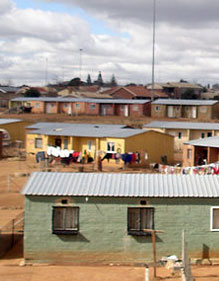|
Getting your Trinity Audio player ready...
|
 John Twala* is a 47-year-old father of two from Johannesburg’s West Rand in Johannesburg who reported a case of suspected illegal occupation of his RDP to Corruption Watch earlier this year. An investigation was launched that has since revealed that although he had been allocated the stand on which the house in question was built, he never received a subsidy as his municipality could not locate him at the time because he had moved to a different town.
John Twala* is a 47-year-old father of two from Johannesburg’s West Rand in Johannesburg who reported a case of suspected illegal occupation of his RDP to Corruption Watch earlier this year. An investigation was launched that has since revealed that although he had been allocated the stand on which the house in question was built, he never received a subsidy as his municipality could not locate him at the time because he had moved to a different town.
Also read:
* Unknowingly a house owner – for 16 years
* Negotiating the RDP rules and regulations
Twala conceded that the only option left for him would be to deregister his details from the database of his local municipality in Krugersdorp. The Gauteng human settlements department advised him, via Corruption Watch, to take a certified copy of his identity document as well as an affidavit indicating his intentions to the Krugersdorp housing office and the slate will be wiped clean.
It sounds simple enough, but he's currently unemployed and makes his living by moving goods for people in his community of Bekkersdal. This daily hand-to-mouth effort requires that he plan well ahead for his all-important trip to Krugersdorp.
Some more eligible than others
Twala would like to get another opportunity to register for a government-issued house. The rules, however, have changed since his first application. People with disabilities, the elderly and children who head up households are more likely to get houses than he is.
Human settlements minister Lindiwe Sisulu recently declared that people under the age of 40 should not benefit from the housing system sooner than those in the categories listed above.
A statement from her office reads: “The Minister of Human Settlements, Lindiwe Sisulu wish[es] to reconfirm and emphasise that the criteria for allocation of full title housing (full stand BNG houses) has been amended to prioritise the elderly and special groups like military veterans, child headed families and people with disability. The housing database or waiting list is also being audited and adjusted to prioritise possible beneficiaries by age, starting with the elderly and those with special needs.”
The statement further announces that Sisulu urges young people in the lower income earning bracket to “take advantage of the Government Finance Linked Subsidy Programme to enable them to get into the property market.”
This is one of a number of subsidy programmes for first time home owners, said the statement. “This programme is assisting police officials, nurses, teachers and many others who need assistance within this salary bracket. Those who work for government must also take advantage of the Government Employee Housing Scheme that is being finalised with Labour”.
Waiting, only to be disappointed
Where does this leave the likes of Twala, who are able-bodied, but unemployed?
“We have been waiting for those houses a long time. Our ID numbers are all on the list and we were not expecting to be so disappointed. Instead of sleeping in our new houses, we were left outside to sleep among our possessions.”
This is how a GroundUp article quoted a resident of Joe Slovo informal settlement in Cape Town recently. According to the report, some 50-odd families were left stranded after being told that they would not be moving into the houses they had thought were theirs.
They cried foul over the instruction, from a task team made up of community leaders and officials from the National Housing Agency, to demolish the shacks they had been living in to prepare for relocation into the houses.
Between the point when the Joe Slovo residents first signed up for their houses – however many years ago that was – and the minister’s statement, confusion and anger have set in, in response to Human Settlements’ position on allocation priorities.
"Our intention in giving free houses was to right the wrongs of the past and make sure that we can give our people dignity. And that group of people is not the people below the age of 40," Sisulu told journalists recently.
This change in policy has met with criticism from several quarters, including opposition party Economic Freedom Fighters (EFF), as well as civil society.
“As long as there is no quality education and quality jobs, government must provide quality housing for the poor,” read a statement by the EFF.
State withdrawing from some public welfare commitments?
Richard Pithouse, a politics lecturer at Rhodes University, wrote on the South African Civil Society Information Service: “It is Sisulu’s recent declaration that the state intends to do away with the provision of free housing and that people under forty will no longer be eligible for public housing that has been particularly controversial.
“Both aspects of this comment position her in direct contradiction to the law and the policies to which the government is, at least in principle, committed. This is nothing new. When it comes to its response to the urban land occupation the state routinely speaks and acts in direct contradiction to both law and policy. What is significant here is the indication that the state, increasingly short of cash, intends to step back from some of its commitments to sustain some forms of public welfare.”
Pithouse continues: “Sisulu is presenting the state’s public housing programme as if it were a temporary state response to apartheid, which now that things have been normalised, can be abandoned… public housing, far from being some kind of unique and temporary South African exception to the general status quo, is a standard part of even basic social democratic programmes.”
Although Twala does not fall under the much-contested “under 40” bracket referred to in the controversial policy, it does not mean that his situation is not desperate – he’s a man who would be proud to provide liveable shelter for his family. That he went as far as contacting Corruption Watch for help in what turned out to be a service delivery issue – albeit one that he struggled with for years – means that he’s encountered obstacles in getting to what he and millions of other South Africans believe are their constitutional rights to service, including decent housing for those who have none.
“If I should ever be able to say there is no 80-year-old without a house, I would have achieved something. If I can say there is nobody above 60 without a house, I will celebrate. I might even get to the 40-year-olds but right now our indigency policy does not accommodate any of you,” said Sisulu pointedly to the under-40s.
• Not his real name







